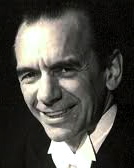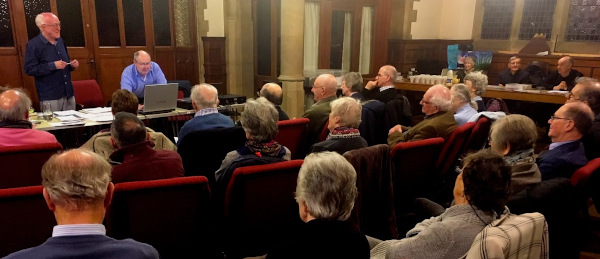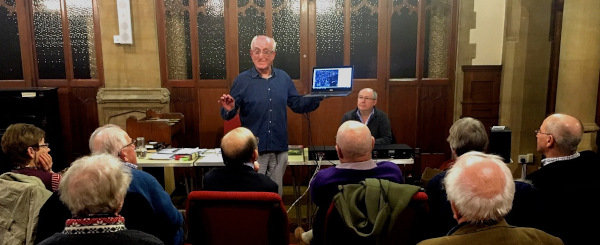Sir Malcolm Sargent
Independent record producer Andrew Keener examines Malcolm Sargent’s extraordinary life and career with archive recordings and video materials. Sir Malcolm (1895-1967) was a conductor, organist and composer with Leicestershire connections but is more famous as chief conductor of the Proms from 1948-1967.

Playlist
| Composer | Work | Performers and Recording |
|---|---|---|
| Gilbert & Sullivan | Three Little Maids from School | Soloists/BBC Concert Orchestra/Sir Malcolm Sargent 1965 Prom. Part of a 1967 LP commemorating Sargent’s life, issued by BBC Records under the title ‘Sir Malcolm Sargent – Music Maker’. |
| Beethoven | Symphony no. 3 (‘Eroica’) (excerpt from the first movement) | Royal Philharmonic Orchestra/Sir Malcolm Sargent. EMI recording, now available from Pristine Audio |
| Beethoven | Symphony no.7 (excerpt from the finale) | BBC Symphony Orchestra/Sir Malcolm Sargent. Part of a 1964 Prom, available from CRQ Editions |
| Elgar | The Dream of Gerontius (opening of Part 2) | Richard Lewis (tenor)/Royal Liverpool Philharmonic Orchestra/Sir Malcolm Sargent. Broadcast of a concert in Huddersfield, 1961, available from Pristine Audio |
| Dohnányi | Suite in F sharp minor (opening of first movement) | Royal Philharmonic Orchestra/Sir Malcolm Sargent. EMI recording, possibly now available on Warner Classics. |
| Beethoven | Piano Concerto no. 3 (opening of finale) | Artur Schnabel (piano)/London Philharmonic Orchestra/Sir Malcolm Sargent. Recorded in 1933. Available on various labels. |
| Sargent | An Impression on a Windy Day | Leicester Symphony Orchestra/John Andrews. Recording in the possession of the Leicester Symphony Orchestra (contact Sam Dobson) |
| Shostakovich | Symphony no. 9 (opening of first movement) | London Symphony Orchestra/Sir Malcolm Sargent. Everest recording. Excerpt at LMS played from an LP. Probably available on CD, but maybe not! |
Appreciation by Bryan Lewis
Andrew Keener, arguably the doyen of Classical Music Recording production, took as his subject the life and career of Sir Malcolm Sargent. For most of us in the audience Sargent will forever be associated with the BBC Symphony Orchestra and the BBC Promenade Concerts. We were reminded of just what a heavy load the Orchestra under his baton carried in the post-World War years well into the 1960s. Indeed, it was characteristic of him to insist on making an appearance, gaunt and clearly desperately ill though he was, at the end of the final Prom in 1967 which had been conducted by Colin Davis. (He died only a few days later.) Sargent cherished the rapport he had with young 'Prommers'. Some professional musicians did not respond to him with respect, however, and, not least, were inclined to sneer at his social climbing. For all that, argued Andrew Keener, Sargent was an insecure man in many ways. He drove his orchestras hard in sometimes adventurous programmes with necessarily limited rehearsal time which occasionally showed in less than polished performances in extant Prom recordings. Sargent's eloquence was not confined to the conductor's rostrum. Andrew Keener played a trenchant clip from a recording of BBC Brains Trust where Sargent jousted with Bertrand Russell during which many of the audience felt that Sargent 'won'!' We have good reason to be grateful for his 'Life and Career'.
Images
Andrew Keener painted a vivid picture of the complex figure Sargent was.

Here reading us a telling vignette from Charles Reid's biography.

Probably the first time a scene from a Carry-On film has been shown in a Society meeting!


